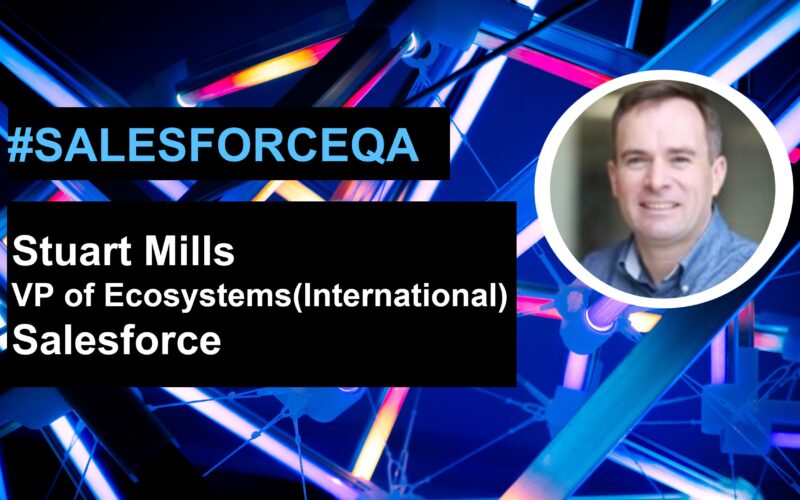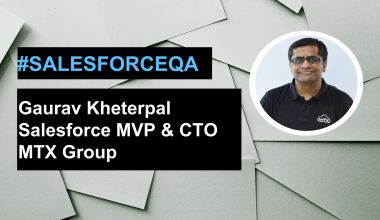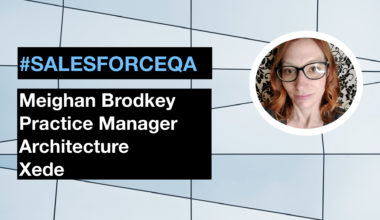In our most recent #SalesforceQA interview, we caught up with VP of Ecosystems (International) at Salesforce, Stuart Mills.
Stuart talks to us about the importance of networking and getting involved in community groups, what Salesforce are doing to reduce the skills gap in the industry, as well as what defines a Trailblazer. Stuart also offers his top tips for others looking to navigate a career in the ecosystem.
Salesforce Republic (SR): Could you talk us through the beginning of your career and how you got to where you are today as VP of Ecosystems at Salesforce?
Stuart Mills (SM): I actually started my career with the Royal Navy as an Air Engineer. From that start to today I’ve always loved complex problems and developing/leading great teams. I came across Salesforce back in 2006, and the platform and Trailblazers helped my businesses, and our people excel.
Building on success in product owner roles led me through a number of leadership roles in Sales & Marketing and in 2017 to try working at Salesforce. Fast forward to my role today and I have the great honour to work for Salesforce to help our international teams pull together our Ecosystem of Trailblazers so we can collectively offer more #Dreamjobs and re-skilling opportunities.
SR: In your experience what are some of the key traits needed for a successful career working in either the Salesforce ecosystem or in tech in general?
SM: I think its true of most careers – but definitely in technology and the Salesforce Ecosystem – that you need traits of: critical thinking & creativity; working through agility & responding to change; bravery to choose a next best action … and be wrong; infinite learning. Oh and of course it needs saying every time that you need to be: outcomes focused; driven by purpose; and bounded by values such as ours: Trust, Customer Success; Innovation; and Equality.
SR: How important is networking and getting involved in community groups when it comes to career success in the tech industry?
SM: I’m quite an introvert but social connection is a critical part of my day and has been across my career. I love being part of a global Trailblazer network and am always learning from others in the groups and finding opportunities. I’ve always tried to live up to giving more and then found that I get more back. I don’t think I’d have the opportunity to contribute that I do today without having built connections and given into the community. Thank you to everyone who helped me along the way!
SR: What initiatives does the Salesforce ecosystem have in place to increase diversity and inclusion within the ecosystem?
SM: We have over 60 different programs and over 20 workforce development partners working on how to help people into the Salesforce Ecosystem, and to develop their careers. Throughout all these programs, and when we choose partners, we always aim for inclusive quality education through Trailhead, promote lifelong learning opportunities for all, and focus on decent and productive work for all. Salesforce’s equality programs set the tone for looking critically within Salesforce at diversity and inclusion. The design principles of these internal programs are the same ones we aim to measure our ecosystem programs against. Those are: have clear diversity targets; adopt inclusive practices (recruitment and delivery); invest in development of people from underrepresented and underserved groups; lead with data as proof of concept.
SR: The need for digital transformation and tech professionals is a hot topic at the moment, could you talk a bit about how Salesforce are creating job opportunities for Salesforce professionals?
SM: We look at this through trying to solve for a problem statement: “Our customers, to realise the potential of digitisation, need to have access to enough diverse, skilled, and experienced people to deliver their transformation.”
To solve for this we of course try and attract talent to the Salesforce Ecosystem, we invest in Trailhead for relevant, timely, lifelong learning, and we provide and partner to deliver higher touch training and certification. The most important piece – and the most difficult to solve – is helping trained professionals get jobs. For this part we’re: running programs such as the Salesforce Talent Alliance where we work with partners and customers to create opportunities; we’re partnering with workforce development organisations; we’re working with government apprenticeship programs; and we’re continuing to look for innovative opportunities to help more. If your community has any ideas how we could do better, please let me know!
SR: A recurring topic within the tech industry is the skills gap, what are Salesforce doing to help reduce this?
SM: To close the skills gap first and foremost Salesforce is focused on providing and developing technology that is both accessible to anyone to start creating value with and scalable to the most ambitious digital transformation. The accessibility of our technology mirrors into many accessible careers that can grow as the ambition of programs develops. I’d then split our actions into three. The first is helping Salesforce Professionals keep upskilling and upleveling their career as we discussed above. The second is broader skills development opportunities through the Trailhead Platform, that we provide for free. The final area is where we provide grants, free/discounted licenses, and volunteer time to educators and skills development programs around the world to help young people and diverse communities access world class learning.
SR: What are your top tips for those looking to navigate a career in Salesforce?
SM: Ah this one’s easy! First – get learning on Trailhead! Next join the Trailblazer community and start attending some meet ups. Look for opportunities to start delivering – start small, get permission to experiment, get on a project. Look into all the places and networks to find opportunities. My recent blog may help.
SR: In your opinion, how important is learning and alongside that the Trailhead platform, when it comes to the ever-growing, ever-changing world of Salesforce?
SM: Things are moving so fast in our world today. I’m reminded by a quote from Will.i.am in 2018: “We’re consuming information at the speeds of space travel, there’s no absorbing. There’s so much information being thrown around that it’s hard to keep up to know what’s real and what’s fake.”
The ever evolving and expanding Salesforce 360 Platform is just another example! We can’t set ourselves up to fail by expecting ourselves or anyone else to know everything. However, we can set ourselves up to continually learn new things, to admit when we don’t know something, and to keep learning. Trailhead is Salesforce’s foundation to providing access to learning. The platform is being constantly updated with modules as we learn what’s next. Beyond Trailhead there are fantastic events such as Dreamforce in a normal year, and this year we’ve just started the Trailblazers Innovate series on Trailhead LIVE where everyone can learn about the latest innovations, sign up here.
SR: Following on from that, what do you think defines a Trailblazer?
SM: To me Trailblazers are pioneers, innovators, lifelong learners, movers and shakers. They are leaders who leaves paths for others to follow. Most importantly, people who build a better world for others. Oh and they happen to be Salesforce skilled professionals!
SR: Finally, what’s the best piece of advice you’ve received throughout your career?
SM: I don’t remember one specific piece but lots of pointers to a few key things. Find focus, but be restless, and always say thank you. Learn resilience and be forgiving (of yourself and others). Imagine… if you could activate the potential of everyone you encounter.
If you’re a Salesforce professional and would like to be involved in our Q&A series, please get in touch today!


